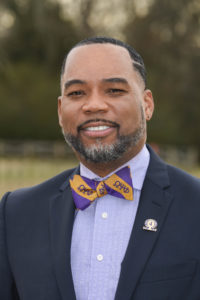This story, written by Daryl Lease ’85, originally appeared in the University of Mary Washington Magazine’s spring/summer 2020 issue.

As a pre-med student at Mary Washington, Anthony D. Jones ’99 volunteered at the nearby Lloyd Moss Free Clinic, shadowing doctors as they provided care to low-income residents, including patients with HIV/AIDS. The experience helped set him on a path of serving the underserved.
“Back then, having HIV was more or less a death sentence,” Jones recalled. “The physicians at the clinic showed a whole lot of compassion taking care of HIV patients. That left a good impression on me.”
Today, the physician is chief medical officer of the Military Entrance Processing Station at Fort Lee, Virginia, and works for Veterans Evaluation Services in Richmond, where he conducts compensation exams for veterans, and recently assisted in daily COVID-19 briefings for a division in the Department of Defense.
He also volunteered at a Virginia Department of Health men’s clinic focused on sexually transmitted diseases, including HIV. Through the nonprofit Minority Health Consortium, he has provided HIV testing and assisted with care coordination for newly diagnosed HIV patients.
Jones grew up in the Fredericksburg area and began his undergraduate studies at James Madison University before joining the U.S. Army. At the end of a three-year stateside tour, he studied at Germanna Community College until Sallie Washington Braxton ’77, now retired as an associate dean at Mary Washington, recruited him for the Bachelor of Liberal Studies program she then led.
His father, a pharmacist, had given lectures at Mary Washington to other professionals. “I was pretty familiar with the school as well as the high caliber of students they took,” Jones said.
Small class sizes and one-on-one attention from professors in the chemistry department helped him succeed, he said, but Professor Emeritus of Physics George King III, who retired from teaching in December, was a special mentor. “I had my first son the same month I started school,” Jones said. King “tried to push me to make sure that I balanced things in the classroom and also talked to me about being a young dad.”
After graduating with distinguished honors, Jones earned a medical degree and a master’s degree in public health from Eastern Virginia Medical School in Norfolk. The pace was quicker at EVMS, he said, but he was well-prepared. “My first year, I felt as though it was a repeat of what I had taken during my last year or so at Mary Washington,” he recalled.
Soon after EVMS, he served as chief of the internal medicine clinic at Fort Lee and, later, as a medical officer at Fort Eustis. “I still wanted to do my part to serve, and I believed in the strong environment and structure from my experience in the Army, so I stayed within the Department of Defense and the VA,” he said.
In addition to his full-time duties, Jones has worked as an independent contractor at hospitals in the Richmond area and in Fredericksburg at Mary Washington Hospital.
After the pandemic ends, Jones said his next goal is to work at an urban clinic, perhaps in Washington, D.C. Helping others, especially underserved minorities, he said, will remain central to his career.
“That was something that was in me from the start, which is why I enjoyed being able to volunteer at the Lloyd Moss Free Clinic.”
George King III Biography
University of Mary Washington Professor Emeritus of Physics George King III, who retired in December, promoted the integration of science and math in classrooms for decades, well before the term STEM was coined in 2001.
After joining the Mary Washington faculty in 1987, King served as physics chair, a research advisor to numerous students and taught nearly every class offered by the department. He authored the lab curriculum for introductory classes at UMW and implemented experimental components into upper level courses.
During his first year as a faculty member, King created the Mary Washington Sciences Institute, serving as its director for a decade. Under his guidance, the 1992 summer program was selected as a state model by the U.S. Department of Education.
Visiting Assistant Physics Professor Laura Dickinson, who was a student of King’s, said of him, “I remember him as a patient and dedicated professor for whom I had great respect. The physics department will not be the same without him, and he will be greatly missed. We all wish him an enjoyable and well-deserved retirement.” – Neva Trenis, editor, University of Mary Washington Magazine
What a pleasure to read of your accomplishments and goals. I hope you will consider helping Bread for the City in Washington DC, a Free Clinic where I volunteered during the AIDS epidemic. I believe it would be a good match for you both.
my very best to you and thank you for your commitment,
Jerri Barden Perkins, MD 1961